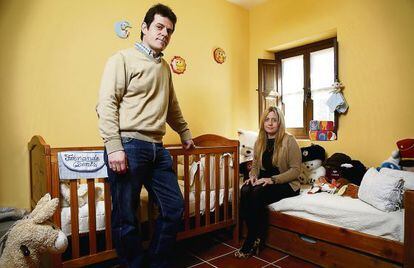“We lost our child to bureaucracy”
Several families have been denied the chance to adopt children from Russia The delay has been caused by Madrid and Moscow's hammering out of a bilateral agreement

Denis will never know that he had another set of parents who lived in Spain, 10,000 kilometers away from where he is. He will never find out that for months on end these Spanish parents fought hard to bring him home: they appealed to Congress and the Senate, met with government representatives, collected signatures and staged protests.
In the end, Denis was adopted by a family from his home country, Russia. Before that, though, he had been assigned to Luis Miguel García and Paula Arranz, one of more than 500 couples whose application was put on hold last summer while Madrid and Moscow ratify a bilateral agreement on international adoption. The document has yet to be signed.
The affected parties do not know exactly how many couples have lost the child that they had already traveled to meet personally, but they estimate it must be around 10. The Spanish Health Ministry says that it is only aware of two cases.
"We felt he was already our child. The pain is very difficult to explain," says García. "We have lost him to bureaucracy."
When García, 39, and Arranz, 37, began doing the paperwork in July 2012, little did they know that the homophobic legislation endorsed by Russian president Vladimir Putin would change their lives. Early last summer, Russia prohibited same-sex couples and single-parent families from adopting children. Even after that, the Putin administration was still concerned that if Russian children adopted by foreigners ultimately became wards of the state (the occurrence of this is just one percent), they might end up in the hands of gay or lesbian foster parents, as Spain permits same-sex marriage.
We felt he was already our child. The pain is very difficult to explain"
So on August 29, the Supreme Court issued instructions freezing all court cases involving couples from countries that allow same-sex marriage, until these governments sign a special bilateral agreement with Moscow. Around 500 families were affected by this measure. Now, six months later, that figure has risen to 600 since the assignations keep trickling in.
By October of last year, Spain and Russia had already put the finishing touches on the main points of their bilateral agreement. Putin's fears of having Russian children raised by homosexuals have been dissipated: the kids will undergo psychological evaluations until the age of 18, and if they should be declared wards of the state, Spain will inform Moscow before assigning them to a new family. Sources at the Russian embassy confirmed that the entire document is ready save for one percent consisting of "technical details."
Embassy sources also said that five separate Russian ministries are involved in the signing of the bilateral agreement. "We trust that it can be signed before the end of the year," they stated.
García and Arranz have always known that international adoption is subsidiary in nature, meaning that authorities place the stress on keeping the children in their home country whenever possible.
"But who in their right mind could make such small children, between two and three years of age, wait around inside an orphanage at such a crucial time? We knew that losing the assignation was a possibility, but if everything had gone well we would have had Denis with us by October or November. We had his room and his clothes ready for him... The problem is that trials were put on hold and the child remained on the Russian database. On February 6 I got a call and was informed that he had been adopted by another couple," says García.
Who could make such young children wait inside an orphanage at such a crucial age?"
García, who has spent the last six months coordinating the efforts of affected families to demand a solution to their problem, criticizes the government for not pursuing a diplomatic solution: "At the technical level, everything was exemplary. In a month-and-a-half they've completed an agreement that had been under discussion since 2009. But I don't understand why ministers did not move more on this."
Spanish authorities say that "Spain is ready to sign at any moment; we are waiting on Russia."
Now, after several failed attempts, it looks like the adoption trials may be getting underway again.
"Last December, the Russian Supreme Court ruled in favor of an appeal by a Spanish couple protesting the denial of their adoption application. The judges fell back on a 1990 covenant between Spain and the Soviet Union in which both nations pledged to respect the court rulings of the other," notes Antoni Mercadal, director of Infància i Futur, a non-profit organization that assists couples seeking to adopt abroad.
Even though they lost Denis, García and Arranz continue to represent affected couples. They are perfectly familiar with the Foreign Ministry's agenda and they are regularly in touch with the authorities. Above all, however, they want to have a child, so they have requested a new assignation. In the meantime, they continue to help other couples who share their anguish.
The figures
The average cost of an adoption in Russia is 30,000 euros, according to groups specializing in international adoptions, known as ECAsI. Around 10 Spanish families have lost the assignation of the child they were hoping to adopt. They had already paid part of that money.
• In 2012, the last year in which adoptions took place normally, 479 Russian children arrived in Spain. Of the 34 countries that Madrid had agreements with, Russia was the home country of most adopted children.
• Since 2004, the number of international adoptions in Spain has decreased significantly: from 5,541 eight years ago to 1,669 in 2012.
• The ECAIs working in Russia complain that if adoption trials are not held again soon, their economic survival is in danger.











































